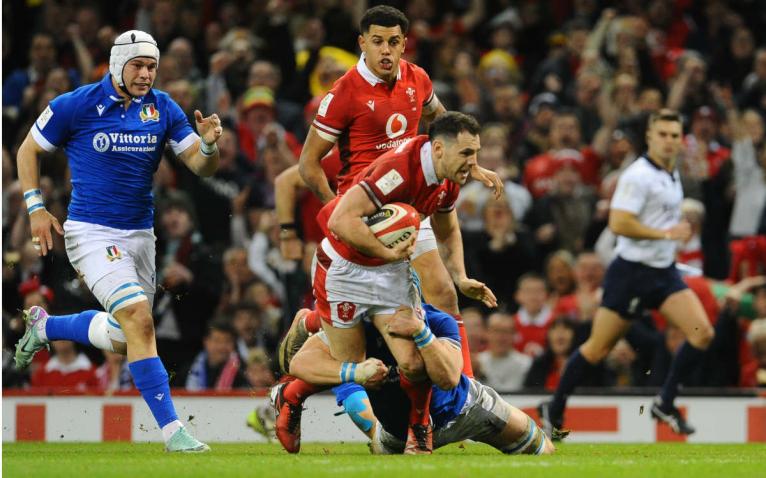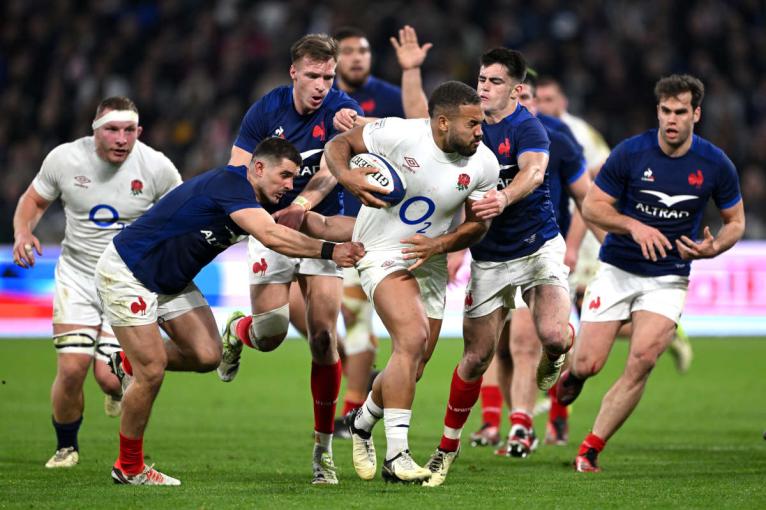Ireland reign supreme but there is one area they're worse than Wales - Six Nations

In just seven weeks, the fortunes of the teams in the Six Nations have changed dramatically. For some, clear growth has been seen and there are green shoots of optimism springing up. For others, that optimism has been slowly extinguished over the five rounds. With the men’s Six Nations filed away for another year, we look at the key stats from this year’s tournament and take a look at where each team will look to improve for the summer and autumn Tests later this year.
Wasteful Ireland
Ireland had a perfect Six Nations. Almost. At one point it looked like they would secure the double Grand Slam with five consecutive victories in the men’s Six Nations and five in the U20s. Unfortunately, hope of a Grand Slam ‘double’ hit the skids on the same weekend. First the U20s drew with England then the senior men lost at Twickenham in one of the great Six Nations encounters on a scintillating weekend of action.
It was a tournament which hit serious highs for Ireland. But their exceptional team of coaches will be looking for marginal gains to grow this evolving side. One area they can focus on is a wasteful attack. By tries scored, Ireland led the table. They scored 19, six ahead of France, England, and Wales on 13. However, they were inefficient – by their lofty standards – when entering the opposition 22. Ireland scored a try on 34% of their 22 entries, but that is behind Wales (35%) and Scotland (36%) and level with Italy.

Ireland far exceeded the number of 22 entries achieved by both Wales and Scotland, as you can see in the table above. The reason why the Irish efficiency is important though is because of their final two games. Against England they achieved just eight 22 entries, their lowest of the tournament, and scored a try on the only 25% of them. England had 15, though a lower efficiency rate of just 20% meant they came away with a single try more. Against Scotland they had 14 entries, their highest of the tournament, but scored a try on just 14% of them.
Those games against England and Scotland go down as warning signs of what can happen if Ireland don’t improve their efficiency, especially with a titanic series against world champions South Africa up next. Against England of course they lost but against Scotland they should have been not only victorious but victorious with a bonus point given the openings they created. Instead they scored just two tries and had a nervy final few minutes when leading by four points.
There are reasons to be optimistic for Wales judging from 22 entries. They had as many entries as they allowed for a difference of 0. Across a league season we would expect a team with a 22 entries difference of 0 to win roughly as many games as they lost. In Wales’ case, they lost every game and took back the Wooden Spoon for the first time since 2003. Equally, there are reasons for slight pessimism for both Italy and Scotland. They both won two matches but those underlying stats suggest those results won’t be sustainable.
A game of possessions
We rarely talk about possessions but they are the driving force of a well-honed attack. Simply put, a possession is every time you have the ball. For example, a team kicks off to you and you carry for a couple of phases before kicking the ball back – that is one possession. If the opposition immediately kick back, then you have started your second possession. On average, teams had 36 possessions per match but these were not evenly distributed.
Ireland topped the charts with 40.6 possessions per game and Wales were bottom with 34. However, Wales and Ireland had 21 minutes of possession per match, the most of the tournament. Wales achieved this by squeezing everything out of the possessions they did have with an average time per possession of 36.9 seconds. That was the highest in the tournament and four seconds higher than the next highest, France.

While that sounds positive for Wales, they frequently overplayed when they did have possession. Think back to their relentless pick and goes against Ireland which resulted in nothing more than an eventual mistake or turnover. One of Wales’ weaknesses was an insistence on keeping ball in hand until they had to kick. Teams always want to kick on their own terms. Louis Lynagh’s try against Scotland was a perfect example of kicking early in your possession rather than waiting for all other avenues to be shut down. Italy won the ball in the air, carried once, and then chipped into the space created by their dynamic attack. Too often, Wales were forced to kick when all other avenues had been shut down. That made their kicking game less effective and not a single Welsh try came directly from their own kick.
Looking at possessions can also help us understand a team’s playing style. Against Ireland, England passed 4.5 times per possession, their highest total of the tournament. Their previous matches had been 4.1 vs Italy, 2.9 vs Wales, and 3.5 vs Scotland. Despite the narrative England got more expansive and adventurous as the tournament went on, their total against France was just 2.3. While England have gradually become more expansive, they still maintain multiple playing styles and can pull out whichever one suits their requirements. Expect to see their barnstorming style in good weather or against weaker opposition and their more pragmatic style in the rain or against a team who are more dominant in defence.
Shape of the game
The end of a tournament is a great time to reflect on how the game as a whole has evolved and what this might mean for the future. Let’s have a look at four key stats and compare them to the World Cup and the Six Nations in 2023.
 A few things may jump out at you from this table. First of all, that is an enormous leap of 12% in ball-in-play time between the World Cup and this tournament. The jump is less stark when compared to the previous Six Nations but even a small increase of 23 seconds is to be celebrated. Secondly, kicks are on the increase and there is more of a focus on competitive kicks rather than extended kicking battles. There was some concern after the second round the Dupont Law would blight the games, but it never really reared its head again.
A few things may jump out at you from this table. First of all, that is an enormous leap of 12% in ball-in-play time between the World Cup and this tournament. The jump is less stark when compared to the previous Six Nations but even a small increase of 23 seconds is to be celebrated. Secondly, kicks are on the increase and there is more of a focus on competitive kicks rather than extended kicking battles. There was some concern after the second round the Dupont Law would blight the games, but it never really reared its head again.
The origin of tries will be of interest to coaches and fans alike. Lineouts are only getting more important as almost 60% of tries now come from them, it was below 50% in the two previous tournaments. Increasingly these lineout tries can be traced back to penalties conceded in a position where the best option is to kick to touch. Defence coaches also need to pay attention to ensure their charges don’t give up penalties which lead to these lineout tries. In other positive news, the percentage of tries originating in a team’s own half have stayed the same as they did at the World Cup. Of course, the World Cup featured significant mismatches where long range tries would’ve been expected but it looks like attack coaches in the Six Nations have continued in the same vein.

Finally, the goal-line dropouts per match have dropped considerably. There is still a split over whether the awarding of a goal line dropout is too advantageous to the defence for holding the ball up. The data shows whichever way your opinion falls, we have gone from over two a match to less than one. This is a decrease even from the 2023 World Cup where there were 0.9 dropouts per game.
At the end of a wonderful tournament, it looks like the product on the pitch is in as healthy a position as it ever has been.
Sage is the Official Insights Partner of the Guinness Six Nations, enhancing the fan, player and coach experience through innovative new technology and enhanced insights to the game. Find out how Sage can support your business at sage.com and discover more rugby insights at sage.com/rugby









































































Ireland Reign Supreme? Really?
Of the 6 nations two (Wales and Italy) were not contenders for the title. No credit to Ireland for beating them. A further nation (France) was off the boil. So it was really more like a 3N tournament.
Of the two remaining Irish opponents, one (England) is in rebuild but still managed to beat Ireland. The other (Scotland) was an Irish win, but hardly a beating. It was pretty close, despite being an Irish home game.
Ireland were excellent early last year, but this year they struggled to win a 6N tournament that should have been unusually easy for them to win. They were not dominant against the better teams, and they certainly don’t Reign Supreme.
Let’s hope they reinvigorate their attack before the SA trip.
Lost to England by one point with one man down, at Twickenham. The English will scrape a barrell at anything. England barely beat Italy, struggled with Scotland and quite frankly took a hammering from France. To say then that Ireland had an easy run with the toughest games at the end is quite frankly ignorant, stubborn and most of all, English. Ireland win yet again another 6N and dominated with PD, tries and possession vs all other teams.
Flankly. You missed the memo. The 6N is actually the real World Cup.
Also, looking at the data from last year, it seemed like by far the two biggest predictors of success were (1) kicking more than your opponents, and (2) having a higher rate of line-out wins than your opponents. I haven’t gone through the stats this year with a fine tooth comb, but the increase in kicks per game and the increase in tries from lineouts would suggest that these two metrics are only getting more important.
England’s move away from a kick-heavy game to win against Ireland was seen by some as evidence that running rugby is on the rise. Alternatively it could be taken as evidence that if one team kicks more, and the other team wins more lineouts (as England did) a match is bound to be close to a draw.
I have been finding it odd that points per 22 entry has become such a talked about stat, given that your points per entry can be driven down by having more entries. These data would seem to confirm that it isn’t a useful metric, or at any rate is less useful than total entries.
The key metric for consistent winning is points allowed. Simplistic as it sounds, if you can consistently limit your opponents to under 17 points you always have a shot at closing out a win in the last quarter.
That’s not just about defense, but about the discipline of not conceding penalties or turnovers, not giving away yellow/red cards, not being beaten in the set pieces. and preferably playing in the opponents half of the field.
Conversely it is very hard to consistently win what Americans call “shootout” games, in which you allow high scores and try to beat those high scores with brilliant attacking.
No surprise that the only teams that averaged less than 17 points conceded per game in the 2023 RWC were SA, France, NZ, Ireland and England (current top 5 teams in the world rankings). SA, NZ and France allowed about 12-13 points per game. Two of those were the finalists, of course.
I agree. I don’t get the usefulness of points per entry. How is that metric any more useful than points, full stop?
The team that scored the most points won. No?